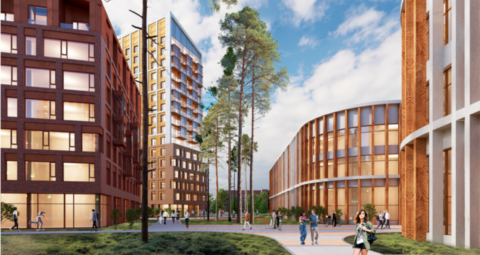In the world-class Interuniversity Campus, which is expected to be built by 2026, the Ecology: Atmosphere-Water-Soil Centre for Collective Use, including 5 laboratories, will be created. The centre will become a platform for applying environmental tasks in production.
According to Vyacheslav Avdin, Doctor of Sciences (Chemistry), Head of the Department of Ecology and Chemical Engineering, the laboratories will be mainly testing pilot technologies. Pilot technology is part of the process of creating industrial technology. After laboratory tests, it is necessary to conduct a set of studies in production conditions, but on a microscale. This is why pilot technologies are so important.
The centre will feature 5 laboratories: an electrochemical laboratory, a laboratory for monitoring the state of water bodies, a laboratory of photocatalysis, a laboratory of air purification methods and a laboratory of monitoring the state of air environments.
The emerging environmental tasks correspond to the names of the laboratory departments: treatment of industrial wastewater, process and waste water; purification of technological and emitted gases; processing of various kinds of waste; development of new "green" technologies to replace the existing chemical industries; monitoring of the state of water bodies and air environments.
The centre will have analytical equipment to help conduct relevant research: potentiostats, dynamic light scattering with microelectrophoresis, static light scattering, UV-vis spectrophotometer, fluorimeter, HPLC-MS, GCMS, AAS, ICP-MS, CHNSCl analyzer and more.
The future laboratory received support from industrial partners. At the moment, PAO Mechel and OOO Techno Plant have confirmed their readiness to participate.
The Chelyabinsk campus sets a number of ambitious tasks: fostering highly qualified specialists for the needs of our region and our country, developing and implementing high technologies for industrial production of the Chelyabinsk Region, digitizing the economy, as well as improving the quality of healthcare. The Ministry of Science and Higher Education of the Russian Federation noted that the work on each of the programs should result in specific scientific and technological, educational, economic or other products that are ready to be implemented both in the region and throughout the country.

Key participants of the campus project are the leading universities of our region: SUSU (NRU), CSU, SUSMU, SUSAU, Nosov Magnitogorsk State Technical University, MIDIS.
Main directions in the activities of the campus:
– Intelligent Production;
– New Materials;
– Living Systems (Ecomonitoring and the State of the Environment; Processing of Biological and Man-made Waste; Hydrogen Technologies; Water, Air and Soil Purification Technologies).
According to the Head of the region, Alexey Texler, the project on creating a world-class interuniversity campus has been developed, federal funding has been approved, and the construction phase has begun. The first objects are planned to be built by 2024, they will be hotels for students. The whole campus is intended to be built by 2025, and to begin training in 2026.
Information:
The federal project on creating a network of campuses is part of the Science and Universities National Project, implemented by the Russian Ministry of Education and Science. The task of creating at least 25 world-class campuses by 2030 was set by the President of Russia Vladimir Putin. Two waves of competitive selection of projects for new campuses have already taken place. In 2021, out of 27 applications received from 22 regions, 8 campus projects were selected for implementation, including a project from the Chelyabinsk Region. In 2022, 39 applications were submitted from 34 regions and 9 campus projects were selected.
South Ural State University is a university of transformations, where innovative research is conducted in most of the priority fields of science and technology development. In accordance with the strategy of scientific and technological development of the Russian Federation, the university is focused on the development of big scientific interdisciplinary projects in the field of digital industry, materials science, and ecology. In 2021 SUSU became the winner in the competition under the Priority 2030 program. The university acts as a regional project office of the World-class Ural Interregional Research and Education Centre (UIREC), which is aimed at solving the tasks of the Science and Universities National Project.
The Interuniversity Campus project is organized as part of the implementation of the Science and Universities National Project.




